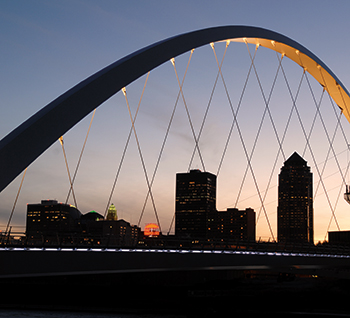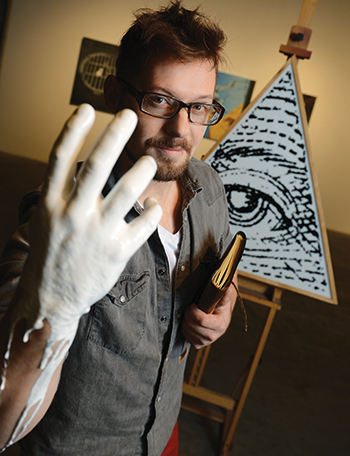 Written by Deb Belt
Written by Deb Belt
Photos by Duane Tinkey
Not too long ago, corporate relocation expert Debra Salowitz was set to show Des Moines to a job candidate and his artist wife. Although it was a Sunday, Jeff Fleming, director of the Des Moines Art Center, agreed to meet the visitors and give them a personal tour of the museum.
The wife “was so impressed with the contemporary art we have here, and (Fleming’s) obvious expertise and his passion for the community,” recalls Salowitz, president of Strategic Relocation Services. “The art and the welcome by Jeff really tipped the balance.”
Such an experience serves to squash any remaining corn-town stereotypes and makes Greater Des Moines more attractive to job candidates than it was even just 10 years ago, local recruiting and relocation experts agree. Credit a rejuvenated downtown landscape, increasing diversity, a good school system, easy commutes, a thriving dining scene, and vibrant arts and cultural offerings for giving Des Moines selling points that compete favorably with those of any metro area. Indeed, Greater Des Moines has landed on so many “best of” lists in recent years that it’s increasingly hard to keep track of all the accolades.
But what, specifically, are recruiters’ go-to spots that help close the deal? To find out, dsm asked Salowitz, Kerry Gumm, director of recruiting for Principal Financial Group Inc., and Mariann Clark, physician recruiter for UnityPoint Health, what impresses would-be transplants the most about their potential new home. Here’s what they told us:
The John and Mary Pappajohn Sculpture Park. Not surprisingly, the sculpture park, with its collection of 28 world-class contemporary works, unfailingly wows prospective transplants no matter where they’re from—including a recent recruit from Paris, France, says Gumm. “Familiar cultural amenities help to bring a sense of home and a level of comfort to candidates looking to relocate to Des Moines,” she says.
The sculpture park offers a stunning, and often surprising, first impression, as visitors see it driving into downtown from the airport, adds Clark. “They are always amazed at its beauty,” she says. At some point in their visit, “they are always given time to tour the park.”
Zanzibar’s Coffee Adventure. Salowitz helps families moving to Des Moines form connections to the community so businesses retain the employees they recruit. The job of forging relationships begins by meeting visitors and their families at Zanzibar’s on Ingersoll Avenue. The locally owned coffeehouse is exactly the type of amenity and atmosphere transplants are often looking for in a new city, she says. “There’s always the beginning of introductions, beyond a cup of coffee, at Zanzibar’s,” she says.
East Village shopping
. This retail district is a must-stop on every tour Salowitz gives to candidates and newcomers. It “always has something for everybody,” she says. Foodies, for example, enjoy shops such as AllSpice, the various cooking classes available and the neighborhood restaurants. “Every community has a mall,” Salowitz says, but “not every community has an East Village, where (the neighborhood) is compact and accessible and (where) you can get to know the vendors.”
Baru 66. This Windsor Heights restaurant consistently wins raves for its sophisticated, contemporary French cuisine and top-notch service. Clark says one couple she took to the restaurant “felt like they were in Paris, even though they’d never been there, because the presentation of each course was spectacular.”
Lucca. Clark also regularly takes out-of-towners to this East Village restaurant, which serves Italian-inspired specialties in a minimalist urban space with exposed brick walls. “Everyone I’ve ever taken there loves the way they have a (prix fixe) menu,” she says.
Baru at the Art Center
. For lunch, Clark enjoys taking recruits to the Art Center, not only because of its cuisine but also because it’s a way to showcase the museum. “I think it gives them the feel that indeed we have a spectacular art center in the city,” she says.
Downtown housing. Residential options downtown have blossomed in the past decade, appealing to those who want to live amid the buzz of an urban setting. On a tour of downtown, job candidates and new arrivals can see such diverse choices as Whiteline Lofts and Brownstones on Grand. “The growth of the downtown Des Moines market with brownstones and condos has added to the diversity in the market,” Gumm says.
“The added benefit that we have is that not too far out of town, you can have a small farm or acreage living, which is an attraction to those who want to live in nature,” she adds. “But you don’t have the hourlong commute you would have in other metro areas.”
desmoinesisnotboring.com. Though the blog is obviously a cyber location instead of a physical one, Salowitz makes sure recruits and transplants know about it. On the site, Pete Jones and other local bloggers share their passion for the city, with tips on restaurants, nightlife, shopping, culture and events.
Wish List.
With good schools, growing diversity, more housing options, and strong arts, entertainment and dining scenes, what’s left? What’s needed to draw potential residents to Greater Des Moines?
It’s a short list, experts agree.
Area walking and bicycling trails are popular, but keeping them groomed in the winter for cross-country skiing would enhance that attraction, Salowitz says.
A performing arts magnet school would also draw some families, she says, so they don’t have to cobble together offerings from various schools and community groups.
And one online site with a comprehensive list of events, concerts and other entertainment options would simplify the search for such offerings, Salowitz adds.
Gumm says that if she hears a “no” from a candidate, it can be because the family doesn’t want to lose a well-developed network of friends or relatives. “That’s hard for any city to overcome,” she says.















